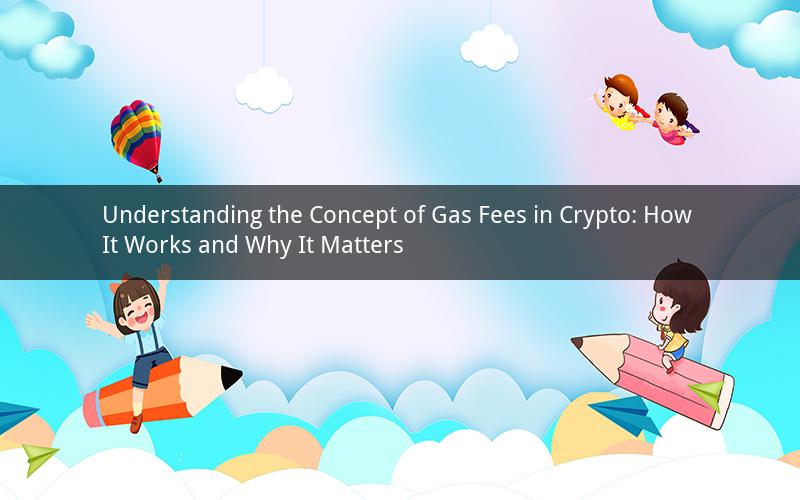
In the rapidly evolving world of cryptocurrencies, one term that has become increasingly important is "gas fee." As blockchain technology continues to gain traction, understanding the concept of gas fees is crucial for anyone looking to navigate the crypto landscape effectively. This article delves into what a gas fee is, how it functions, and its significance in the crypto ecosystem.
What is a Gas Fee?
A gas fee is a small payment made by a user to compensate the miners or validators for the computational work required to process a transaction on a blockchain network. This fee is denominated in the cryptocurrency of the respective blockchain, such as Ethereum's native currency, Ether (ETH). The gas fee is an essential aspect of blockchain technology, ensuring that the network remains secure and efficient.
How Does a Gas Fee Work?
When a user initiates a transaction on a blockchain network, the transaction is bundled into a block and then validated by miners or validators. The gas fee serves as a reward for the computational effort and resources consumed by the miners or validators in processing the transaction.
The gas fee is determined by two factors: the transaction's complexity and the current demand for network resources. Transactions that require more computational power, such as smart contracts, will typically have higher gas fees. Similarly, during times of high network congestion, gas fees can become more expensive due to the increased demand for block space.
Why Does a Gas Fee Matter?
1. Ensuring Network Security
Gas fees incentivize miners or validators to secure the blockchain network. By compensating them for their computational work, the network ensures that these crucial nodes remain motivated to validate transactions and protect the integrity of the blockchain.
2. Preventing Spam
High gas fees act as a deterrent against spam transactions. Users are less likely to send unnecessary transactions when they are aware that doing so will cost them a significant amount of cryptocurrency. This helps maintain the network's efficiency and reduces congestion.
3. Encouraging Efficient Resource Allocation
Gas fees encourage users to optimize their transactions by reducing their complexity and size. This leads to more efficient resource allocation on the network, as users prioritize essential transactions over those that could be considered unnecessary or redundant.
4. Rewarding Miners or Validators
Gas fees serve as a reward for miners or validators who contribute to the network's security and efficiency. This compensation is essential for the long-term sustainability of blockchain networks and ensures that these crucial nodes remain active and motivated.
5. Facilitating Smart Contracts
Gas fees play a vital role in the functioning of smart contracts, which are self-executing contracts with the terms of the agreement directly written into lines of code. The gas fee ensures that smart contracts are executed efficiently and accurately, as users pay for the computational resources required to process these complex transactions.
Frequently Asked Questions
1. Q: Can I avoid paying a gas fee when making a transaction?
A: While it is possible to send a transaction with a very low gas fee, it may result in the transaction being delayed or even failing. It is essential to set a reasonable gas fee to ensure your transaction is processed promptly.
2. Q: Why do gas fees vary from one blockchain network to another?
A: Gas fees vary based on factors such as transaction complexity, network congestion, and the specific blockchain network's economic model. Ethereum, for example, has a different gas fee structure compared to Bitcoin.
3. Q: Can I pay more than the required gas fee?
A: Yes, you can pay more than the required gas fee. This can be useful during times of high network congestion, as it increases the likelihood of your transaction being processed quickly.
4. Q: How does the gas fee affect the overall cost of using a cryptocurrency?
A: The gas fee is a component of the overall cost of using a cryptocurrency. It is essential to consider the gas fee along with other costs, such as transaction fees and network congestion, when evaluating the cost of using a specific cryptocurrency.
5. Q: Can I set a custom gas fee for my transaction?
A: In some blockchain networks, you can set a custom gas fee for your transaction. However, it is crucial to research the network's requirements and best practices to ensure your transaction is processed successfully.
In conclusion, understanding the concept of gas fees in crypto is crucial for anyone looking to navigate the blockchain landscape effectively. By compensating miners or validators for their computational work, gas fees ensure network security, prevent spam, and facilitate the efficient execution of transactions and smart contracts. Keeping these factors in mind will help you make informed decisions when engaging with the crypto ecosystem.